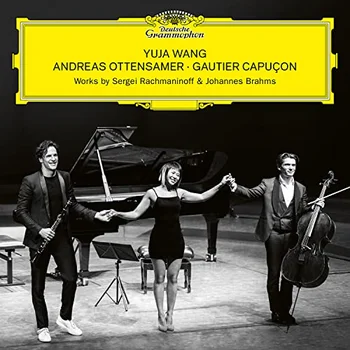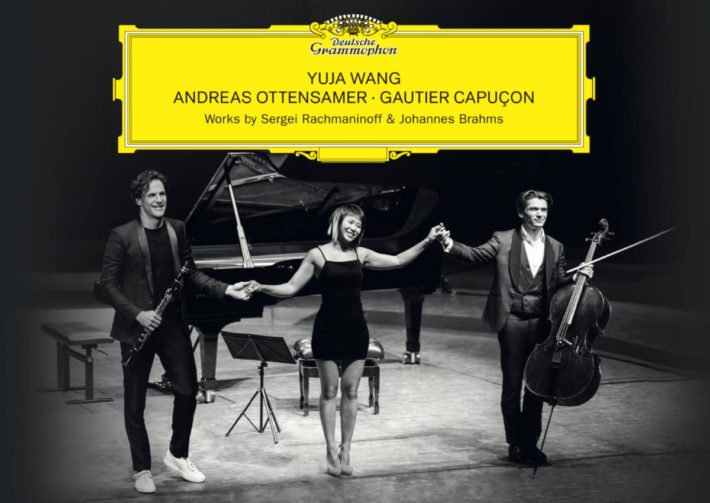Yuja Wang and Gautier Capuçon’s recent collaboration is inspired by an almost 10-year partnership that dates back to the 2013 Verbier Festival. They revisit the Rachmaninoff Cello Sonata which they performed there but also include a new offering of the Brahms Cello Sonata. The concert comes full circle with the Brahms Op. 114 trio that also features clarinetist Andreas Ottensamer.

The Rachmaninoff is oft-visited chamber fare with performances by the likes of the Kanneh-Mason duo (which I reviewed in 2021), Lynn Harrell/Vladmir Ashkenazy, and of course Mstislav Rostropovich/Alexander Dedyukhin from the 1950s. The first movement (track 4) shows plenty of artistry in the way Capuçon transforms the cello‘s voice: the longing, almost alluring call of the instrument gradually develops into a firmly resonant presence. Wang, meanwhile, does a nice job responding to these fluid changes and tailors her own phrases to capture the expressive nuances. The performance stands out especially in regard to the cellist’s tone quality: where recordings like the Kanneh-Mason duo’s sound overly cautious, Capuçon is not afraid to let the instrument (especially in the lower register) speak nor is he hesitant to bend phrases for the sake of vivid expressivity. The result is an organic interpretation that still has detail and finesse (Wang does her part in bringing clean articulation to many of the accompanimental textures).
The latter two movements don’t exactly match up to the promise of the first. The Andante (track 6) is all about Rachmaninoff’s quintessential romanticism but I felt that neither performer maximized this. Though the writing gives the perfect chance to the pianist to shine, Wang doesn’t take advantage of Rachmaninoff’s gorgeous introduction; her playing lacks the expressive presence that Ashkenazy’s has. Capuçon goes for tenderness in the softer sections, but ends up sounding rather thin in comparison to Lynn Harrell in the same lines. There is also something to be desired in the Finale–no doubt both of the performers are caught up in its energy but a little too much so. The fine phrase control of the first movement is now sadly absent: I found the cello’s main theme out of breath with some key notes not clear. Wang’s crisp articulation is certainly in line with what we heard prior, but it doesn’t work in the opening, which sounds more skittish than jubilant.
The Allegro (track 8) of the Brahms trio shows some fine integration and balance between all three instrumentalists; communication is successful in the way, for instance, Capuçon and Otttensamer mirror each other’s scalar patterns (4:13 onwards). The attention to detail, however, disappointingly doesn’t lead to the most captivating rendition. I found the performance almost too even keeled and restrained, maybe in how each performer remains wary of interfering with the other. Turn to the the 1984 version by Andràs Schiff, Peter Schmidl, and Günter Högner for a more electrifying account: Schiff brings solid depth and power while Schmidl has a more piercing (in a good way) edge to his sound; this really makes the clarinet feel present.
The Andantino Grazioso (track 10) fares better in balancing inviting charm with bounding momentum. Ottensamer replaces his overly silky tone in the Allegro with more variety, especially in the playful interchanges with the cello. Capuçon is very much a driving force in the movement: his pizzicatos sound almost guitar-like, making for an interesting textural addition. Throughout, he also maintains long, arching phrases; the rich tone serves nicely to bridge the piano and clarinet parts. The final Allegro has nice changes of character: we hear moments that are sweeping and orchestral which shift to elegant, dancelike touches. The final moments unfortunately do feel a bit jumpy with overly-short staccatos.
Guido Fischer’s liner notes balance historical, musical, and artistic perspectives all while remaining an approachable read. The sound engineers do a fine job in preserving a good level of clarity to each performer’s lines while still allowing us to hear a nice blend of harmonies when the lines move in parallel fashion.
Given the more than stellar precedence of each artist, I had high hopes for an equally captivating collaboration. Sadly, that was not quite the case here despite their efforts. Listeners will likely want to turn to other reference recordings for a fully immersive listening experience.
Recommended Comparisons
Rostropovich | Schiff | Mork
Works by Sergei Rachmaninoff & Johannes Brahms
Gautier Capuçon – Cello
Andreas Ottensamer – Clarinet
Yuja Wang – Piano
Deutsche Grammophon, CD DG 4862388



















